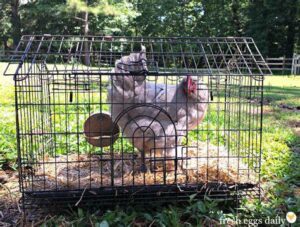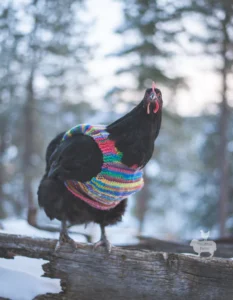By Suzanne Sparrow Watson
 Have you seen the price of eggs lately? They have skyrocketed in the past few weeks, particularly here in Arizona. Beginning January 1, chicken farmers here have had to double the space provided for their laying hens. The new law has caused egg production to diminish by roughly half, while the increase in prices has roughly doubled. Elsewhere in the country egg prices have increased due to avian flu and weather conditions. So, Americans are doing what they normally do in a crisis – taking matters into their own hands and becoming chicken farmers. People are rushing to farm supply stores, hell-bent on becoming more self-sufficient when it comes to their breakfasts. Unfortunately, like many trends that make their way to TikTok and other social media platforms, this has not been particularly well thought out. I should know, for a brief time in my youth I was the proud owner of a chicken.
Have you seen the price of eggs lately? They have skyrocketed in the past few weeks, particularly here in Arizona. Beginning January 1, chicken farmers here have had to double the space provided for their laying hens. The new law has caused egg production to diminish by roughly half, while the increase in prices has roughly doubled. Elsewhere in the country egg prices have increased due to avian flu and weather conditions. So, Americans are doing what they normally do in a crisis – taking matters into their own hands and becoming chicken farmers. People are rushing to farm supply stores, hell-bent on becoming more self-sufficient when it comes to their breakfasts. Unfortunately, like many trends that make their way to TikTok and other social media platforms, this has not been particularly well thought out. I should know, for a brief time in my youth I was the proud owner of a chicken.
 Novato was still a rural community in the 1950’s, with many dairy and chicken farms in the surrounding area. My third-grade teacher thought it would be a wonderful life lesson for us to see the cycle of life, at least with respect to chickens and eggs. Perhaps she was trying to provide a real-life illustration of the age-old quandary of which came first. In any event, she brought a chicken coop into the classroom and every morning we rushed to the coop to see if the chicken had laid an egg. After four weeks of a squawking chicken and a room full of distracted third graders, she decided to end the “chicken lesson”. But instead of taking the chicken back to where she got it, she asked if anyone wanted to adopt it. My hand shot up and several hours later I proudly walked home with “Henrietta”. I cannot recall my parents’ reaction to the new addition to our family, but I can’t imagine it was good. I quickly discovered that chickens take a lot of work and… this is the tough part…their excrement smells like, well, chicken excrement. Details escape me but I think Henrietta quickly wore out her welcome and my dad took her to our next-door neighbor who already owned chickens. It was perfect, I could visit her but not have to care for her, or more critically, clean up after her.
Novato was still a rural community in the 1950’s, with many dairy and chicken farms in the surrounding area. My third-grade teacher thought it would be a wonderful life lesson for us to see the cycle of life, at least with respect to chickens and eggs. Perhaps she was trying to provide a real-life illustration of the age-old quandary of which came first. In any event, she brought a chicken coop into the classroom and every morning we rushed to the coop to see if the chicken had laid an egg. After four weeks of a squawking chicken and a room full of distracted third graders, she decided to end the “chicken lesson”. But instead of taking the chicken back to where she got it, she asked if anyone wanted to adopt it. My hand shot up and several hours later I proudly walked home with “Henrietta”. I cannot recall my parents’ reaction to the new addition to our family, but I can’t imagine it was good. I quickly discovered that chickens take a lot of work and… this is the tough part…their excrement smells like, well, chicken excrement. Details escape me but I think Henrietta quickly wore out her welcome and my dad took her to our next-door neighbor who already owned chickens. It was perfect, I could visit her but not have to care for her, or more critically, clean up after her.
 Given my brief stint as a chicken owner, I’ve been fascinated by this recent trend in chicken farming. As I learned, raising chickens is not easy, or necessarily cost-effective. Baby chickens are selling for $5 each. Sounds cheap, however, feed ranges from 10 to 20 cents a bird per day and coops cost between $400 and $3,000. Other costs for the birds include heating and fencing. And most people don’t realize that hens don’t lay eggs in winter conditions. Perhaps they come to Arizona like the other snowbirds? One new owner adopted seven chicks four months ago and estimates she’s spent about $750 on food, bedding, heat lamps and other supplies. She doesn’t have a single egg to show for it. That makes paying $8 for a dozen eggs sound like a bargain.
Given my brief stint as a chicken owner, I’ve been fascinated by this recent trend in chicken farming. As I learned, raising chickens is not easy, or necessarily cost-effective. Baby chickens are selling for $5 each. Sounds cheap, however, feed ranges from 10 to 20 cents a bird per day and coops cost between $400 and $3,000. Other costs for the birds include heating and fencing. And most people don’t realize that hens don’t lay eggs in winter conditions. Perhaps they come to Arizona like the other snowbirds? One new owner adopted seven chicks four months ago and estimates she’s spent about $750 on food, bedding, heat lamps and other supplies. She doesn’t have a single egg to show for it. That makes paying $8 for a dozen eggs sound like a bargain.
 When people realize that chicken farming isn’t all romance and eggs benedict, the question arises as to how to dispose of the chicken? In olden days, once hens could no longer produce eggs, they became dinner. But many new chicken owners are reluctant to eat their hens. In fact, some say they have become a part of the family. One woman in my knitting group has knit sweaters for her daughter’s chicken. We thought she was joking, but it turns out it has been a popular fashion trend for chickens. Apparently, people are mis-guided in thinking that chickens get cold, when in fact, sweaters actually inhibit the hen’s ability to shed feathers. But like the people who put a ballerina skirt on their dog, sometimes common sense plays no part when it comes to people and their animals. All I know is, although my time as a chicken owner was brief, it did inform me as to how convenient it is to buy eggs at the grocery store, regardless of price. The eggs are ready to eat and better yet, you don’t have to muck around in chicken excrement to get them.
When people realize that chicken farming isn’t all romance and eggs benedict, the question arises as to how to dispose of the chicken? In olden days, once hens could no longer produce eggs, they became dinner. But many new chicken owners are reluctant to eat their hens. In fact, some say they have become a part of the family. One woman in my knitting group has knit sweaters for her daughter’s chicken. We thought she was joking, but it turns out it has been a popular fashion trend for chickens. Apparently, people are mis-guided in thinking that chickens get cold, when in fact, sweaters actually inhibit the hen’s ability to shed feathers. But like the people who put a ballerina skirt on their dog, sometimes common sense plays no part when it comes to people and their animals. All I know is, although my time as a chicken owner was brief, it did inform me as to how convenient it is to buy eggs at the grocery store, regardless of price. The eggs are ready to eat and better yet, you don’t have to muck around in chicken excrement to get them.